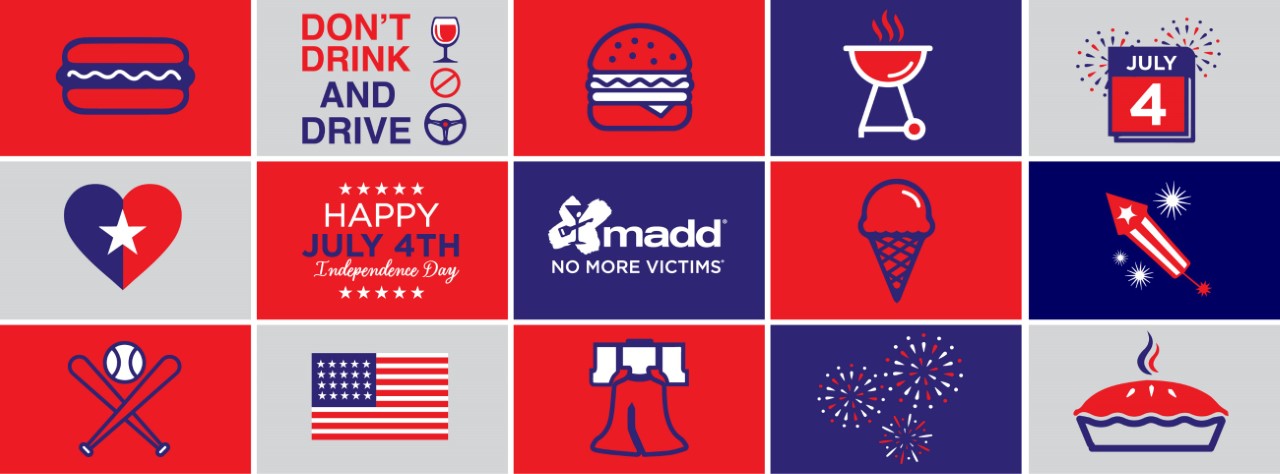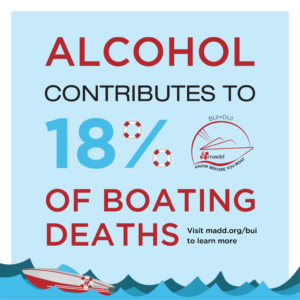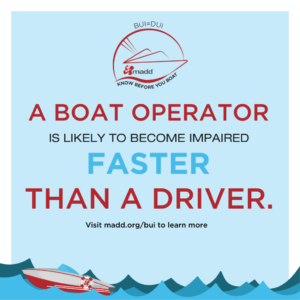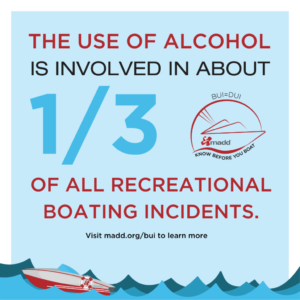Keep July 4th Celebrations Safe

If You Drink, Don’t Drive
Drunk Driving Responsible for 41% of Traffic Deaths in 2020
Mothers Against Drunk Driving (MADD) urges everyone to celebrate safely by planning ahead and designating a non-drinking, unimpaired driver during the long July 4th holiday weekend.
According to the National Highway Traffic Safety Administration (NHTSA), 201 people died in alcohol-related crashes from 6 p.m. July 2 to 5:59 a.m. July 6, 2020. Drunk driving was blamed for 41% of all traffic deaths during the long weekend, and 85% of the fatal crashes occurred at night, between 6 p.m. and 5:59 a.m.
“We want everyone to celebrate the Fourth of July weekend with a plan that keeps themselves, their families, and their communities safe,” said MADD National President Alex Otte. “Whether you’re on a road trip, driving just a few blocks to a friend’s house, or going out on the water for the day, the safest choice is to never drink and operate any vehicle.”
In 2020 nationally there were 11,654 fatalities in motor vehicle traffic crashes in which at least one driver was alcohol-impaired. This totaled 30 percent of all traffic fatalities in the United States for the year. In Hawaii, there were 27 impaired driving fatalities or 31% of all traffic fatalities in 2020.
Drunk driving deaths are rising at an alarming rate across the country. Preliminary estimates for 2021 show more than 12,000 people were killed by drunk driving – the highest number since 2007. In 2020, one person was killed in a drunk driving crash every 45 minutes.
On the water, alcohol use is the leading known contributing factor in recreational boating deaths and incidents in the United States. Alcohol was listed as the leading contributing factor in 16% of boating deaths in 2021.
“Once again, this year, officers in collaboration with local, state, and federal agencies will be teaming up for Operation Dry Water (ODW). Law enforcement officers will be on heightened alert for those violating boating under the influence laws, as well as spreading awareness about the dangers associated with BUI.” said CWO Omar Perez from Command Security of the U.S. Coast Guard in Hawaii. Additionally, the Department of Land and Natural Resources Division of Boating and Ocean Recreation is running Boating Under the Influence PSA’s on several radio stations during the month of July.
Operation Dry Water (ODW) is a year-round boating under the influence (BUI) awareness and enforcement campaign. Operation Dry Water’s heightened awareness and enforcement three-day weekend takes place annually around July fourth, a holiday, which is unfortunately known for drinking and boating, and deadly incidents.
“As we celebrate our nation’s independence, we can all contribute to the safety of our communities by making the right choices. If you drink, don’t drive or operate a boat,” said Theresa Paulette, MADD Hawaii, Victim Services Specialist.



OPERATION DRY WATER INFORMATION AND FACTS
National Association of State Boating Law Administrators and
DRINKING AND BOATING ARE JUST AS DEADLY AS DRINKING AND DRIVING
Alcohol is even more hazardous on the water than on land. The marine environment – motion, vibration, engine noise, sun, wind, and spray – accelerates the impairing effects of alcohol. These stressors cause fatigue that makes a boater’s coordination, judgment, and reaction time decline even faster when using alcohol. Alcohol can also be more dangerous to boaters because boaters are often less experienced and less confident on the water than on the highway. Recreational boaters don’t have the benefit of experiencing daily boat operations. In fact, boaters average only 110 hours on the water per year.
Every boater needs to understand the risks of boating under the influence (BUI) of alcohol or drugs. It is illegal to operate a boat while under the influence of alcohol or drugs in every state. The Coast Guard also enforces a federal law that prohibits BUI. This law pertains to ALL boats (from canoes and rowboats to the largest ships) – and includes foreign vessels that operate in U.S. waters, as well as U.S. vessels on the high seas
Boating under the influence (BUI) continues to be a leading factor in incidents and fatalities on our nation’s waterways according to the 2020 U.S. Coast Guard Recreational Boating Statistics.
- Operation Dry Water is a year-round boating under the influence awareness campaign.
- Operation Dry Water facilitates a national weekend of BUI detection and enforcement aimed at reducing the
- Operation Dry Water weekend takes place near July 4th, a holiday known for an increase in alcohol-related incidents.
- Agencies from all 56 U.S. states and territories are expected to participate in Operation Dry Water, and in the 2022 heightened awareness and enforcement weekend, July 2 – 4.
- In 2021, law enforcement officers contacted 328,627 boaters and made 638 BUI arrests over the course of the three-day weekend.
- Boating under the influence is illegal in all states.
- Alcohol use is dangerous for passengers too. Intoxicated passengers can easily slip, fall overboard, or suffer other life-threatening incidents.
- Drugs and alcohol interfere with the brain’s ability to function properly. Tetrahydrocannabinol (THC), which is the main active ingredient in marijuana, affects areas of the brain that control your body’s movements, balance, coordination, memory, and judgment” – NASBLA
BUI=DUI – DANGERS OF BUI
- At .035% blood alcohol content (BAC) a boater’s ability to operate a boat is impaired.
- Alcohol impairs judgment and coordination; two qualities essential for safe boating.
- Alcohol continued to be the leading known contributing factor in fatal boating incidents in 2020, accounting for over 100 deaths, or 18 percent of total fatalities.
- A boat operator is likely to become impaired more quickly than a driver, drink for drink.
- The penalties for BUI can include large fines, revocation of operator privileges, and serious jail terms.
- The use of alcohol is involved in about a third of all recreational boating fatalities
